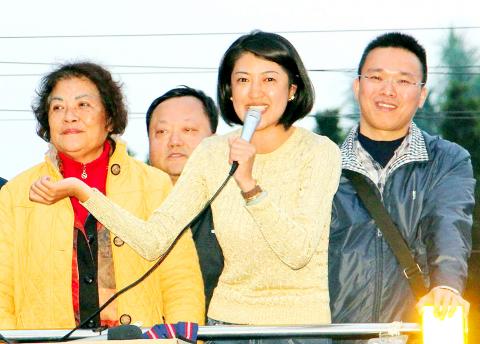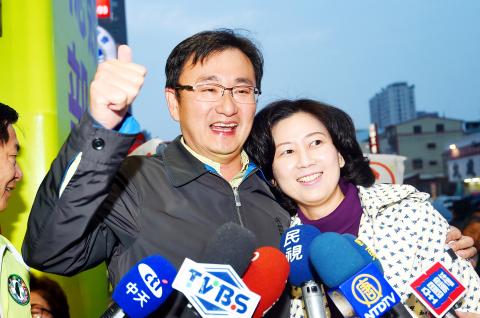The Democratic Progressive Party (DPP) held on to its three seats while the Chinese Nationalist Party (KMT) kept its two in yesterday’s legislative by-elections in five electoral districts — Taichung, as well as Changhua, Nantou, Miaoli and Pingtung counties.
The vacancies were created after five legislators, three from the DPP and two from the KMT, were elected as city mayors or county commissioners in the nine-in-one elections on Nov. 29 last year, in which the KMT suffered an unprecedented defeat and secured just six seats out of 22, a drop from 15.
The by-elections caused no changes to the current legislature’s composition.

Photo: Hsieh Chieh-yu, Taipei Times
In Pingtung, DPP candidate Chuang Ruei-hsiung (莊瑞雄), with 42,988 votes, won in a landslide against the KMT’s Liao Wan-ju (廖婉汝), who received 20,627 votes. The southern county’s election had the largest vote difference among the five regions contested.
The closest race was in Nantou, where KMT candidate Hsu Shu-hua (許淑華) won with 38,694 votes, edging past the DPP’s Tang Huo-sheng (湯火聖), who secured 34,938 votes.
The DPP’s legislative candidates for Taichung — Huang Kuo-shu (黃國書) — and Changhua — Chen Su-yueh (陳素月) — also won their electorates, after leading their main KMT competitors, former vice premier Hsiao Chia-chi (蕭家淇) and former Changhua County commissioner Cho Po-yuan (卓伯源) respectively, by more than 10,000 votes.

Photo: Liao Yau-tung, Taipei Times
Huang received 45,143 votes to Hsiao’s 32,917, while Chen garnered 51,907 votes — 17,200 more than Cho’s 34,707.
In Miaoli, DPP Legislator-at-large Wu Yi-chen (吳宜臻), who had withdrawn from the contest to yield the opportunity to student activist Chen Wei-ting (陳為廷) before Chen dropped out due to a groping scandal, lost the election to the KMT’s Hsu Chih-rong (徐志榮), who topped Wu’s 32,966 votes with 47,105.
The newly elected legislators are to serve short terms, as the election for the ninth legislature is scheduled for early next year.
Whether that election is to be synchronized with next year’s presidential election, usually held in March, is still being debated.
The DPP last night thanked voters for their support in the by-elections, vowing to work harder in Miaoli and Nantou counties.
“These [results] show that voters still hold high expectations for further reforms, so the candidates must therefore remember the responsibilities that voters have placed upon them and stay loyal to the people,” DPP Secretary-General Joseph Wu (吳釗燮) told a news conference.
DPP Campaign Strategy Committee convener Su Jia-chyuan (蘇嘉全) attributed the KMT’s victories in Miaoli and Nantou counties to the KMT’s strong local organizations.
Su said that the DPP’s securing of the other three seats gives the party more confidence for the future, as it demonstrated that voters trust the party.
KMT spokesperson Lin Yi-hua (林奕華) offered congratulations to the two KMT candidates who were elected yesterday, and extended her regards to the other three candidates who lost.
She said the KMT thanks the voters for their support as the party recovers from its greatest defeat ever in November last year and promises to continue its efforts with the utmost sincerity and innovation.

CHAOS: Iranians took to the streets playing celebratory music after reports of Khamenei’s death on Saturday, while mourners also gathered in Tehran yesterday Iranian Supreme Leader Ayatollah Ali Khamenei was killed in a major attack on Iran launched by Israel and the US, throwing the future of the Islamic republic into doubt and raising the risk of regional instability. Iranian state television and the state-run IRNA news agency announced the 86-year-old’s death early yesterday. US President Donald Trump said it gave Iranians their “greatest chance” to “take back” their country. The announcements came after a joint US and Israeli aerial bombardment that targeted Iranian military and governmental sites. Trump said the “heavy and pinpoint bombing” would continue through the week or as long

TRUST: The KMT said it respected the US’ timing and considerations, and hoped it would continue to honor its commitments to helping Taiwan bolster its defenses and deterrence US President Donald Trump is delaying a multibillion-dollar arms sale to Taiwan to ensure his visit to Beijing is successful, a New York Times report said. The weapons sales package has stalled in the US Department of State, the report said, citing US officials it did not identify. The White House has told agencies not to push forward ahead of Trump’s meeting with Chinese President Xi Jinping (習近平), it said. The two last month held a phone call to discuss trade and geopolitical flashpoints ahead of the summit. Xi raised the Taiwan issue and urged the US to handle arms sales to

BIG SPENDERS: Foreign investors bought the most Taiwan equities since 2005, signaling confidence that an AI boom would continue to benefit chipmakers Taiwan Semiconductor Manufacturing Co’s (TSMC, 台積電) market capitalization swelled to US$2 trillion for the first time following a 4.25 percent rally in its American depositary receipts (ADR) overnight, putting the world’s biggest contract chipmaker sixth on the list of the world’s biggest companies by market capitalization, just behind Amazon.com Inc. The site CompaniesMarketcap.com ranked TSMC ahead of Saudi Aramco and Meta Platforms Inc. The Taiwanese company’s ADRs on Tuesday surged to US$385.75 on the New York Stock Exchange, as strong demand for artificial intelligence (AI) applications led to chip supply constraints and boost revenue growth to record-breaking levels. Each TSMC ADR represents

State-run CPC Corp, Taiwan (CPC, 台灣中油) yesterday said that it had confirmed on Saturday night with its liquefied natural gas (LNG) and crude oil suppliers that shipments are proceeding as scheduled and that domestic supplies remain unaffected. The CPC yesterday announced the gasoline and diesel prices will rise by NT$0.2 and NT$0.4 per liter, respectively, starting Monday, citing Middle East tensions and blizzards in the eastern United States. CPC also iterated it has been reducing the proportion of crude oil imports from the Middle East and diversifying its supply sources in the past few years in response to geopolitical risks, expanding